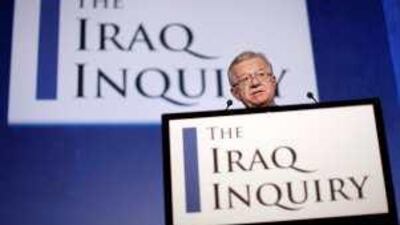LONDON // A long-awaited and potentially explosive inquiry into Britain's role in the Iraq war and its aftermath, finally got underway in London yesterday. Sir John Chilcot, who is chairing the government-ordered inquiry, promised that his five-member panel would "not shy away from making criticism". When the British prime minister, Gordon Brown, announced the inquiry in June after months of growing political pressure, he declared that the hearings would be held in private and "would not apportion blame".
In the outcry that followed, Mr Brown was forced into an embarrassing u-turn, conceding that most of the hearings would, in fact, be in public and would only be held in camera when national security was at stake. Sir John, a career civil servant, has now also made it clear that he will not hesitate from apportioning blame. "We are determined to be thorough, rigorous, fair and frank to enable us to form impartial and evidence-based judgments on all aspects of the issues, including the argument about the legality of the conflict," he said at the opening of the inquiry.
"The inquiry is not a court of law and nobody is on trial. But I want to make something absolutely clear: the committee will not shy away from making criticism. "If we find that mistakes were made, that there were issues which could have been dealt with better, we will say so frankly." Tony Blair, the prime minister when the US-led invasion was launched six years ago, will be the star witness called to give evidence.
A crucial question is the legal advice the government used to justify the invasion. There have long been reports that the Attorney General's original opinion was that the war would contravene international law. Mr Blair is also likely to be closely questioned on the bogus intelligence he was given over the existence of weapons of mass destruction that Saddam Hussein supposedly possessed. And there is likely to be severe criticism of the lack of thought that went into planning for the reconstruction of Iraq after Saddam had been ousted.
The inquiry will also take a critical look at British operations in Basra, particularly the decision to pull out of patrolling the city after reaching an agreement with local militias. Sir John, who has appointed a panel of top lawyers and retired military men to act as advisers, said that he did not expect to produce a report on his findings until late next year at the earliest. This, at least, will provide some comfort for the government as its publication will come some months after the latest date for a general election.
Among the first witnesses are likely to be members of families who lost loved ones in the conflict and veterans' groups concerned about how - and why - the war was fought. Asked if Mr Brown himself would be asked to give evidence, Sir John said that he was "not proposing today to offer a list of witnesses" but reiterated his committee's desire to question the "key decision-makers in the different phases of the Iraq affair".
He added: "You can work out for yourselves who some of those would be." Sir John also made it clear that he would also like to take evidence from overseas governments, including senior members of former president George W Bush's administration. "We have no power to compel witnesses here, let alone people in foreign governments," he said. "Nonetheless, the Anglo-American relationship is one of the most central parts of this inquiry, and how that was conducted is something that we need to get a very strong understanding of."
Concerns remain, however, over how much the excuse of national security will be used to hold the inquiry's hearings in private. Sir Menzies Campbell, the former leader of the Liberal Democrats - the only one of the three main political parties to oppose the war - told the BBC that it was essential that the public were not "denied essential information". He added: "It is important that national security should not be regarded as a synonym for government embarrassment.
"We have never had a proper inquiry into how it was that government came to reach this decision [to invade]. "For example, how was it that the cabinet was apparently taken along the path towards military action without any kind of resistance, except from Robin Cook and Clare Short?" Sir John dismissed concerns that his report would be seen as a "whitewash". "The independence of the members of this inquiry, I think, can't reasonably be challenged," he said. "None of us is partisan, none of us, as it were, holds the patronage of the government behind us.
"What we have to do, to secure the confidence in our report that it shan't be seen as a whitewash, is to do the job as thoroughly, as fairly, as independently as we can." Between 2003 and 2009, 179 British service personnel were killed in Iraq. About 150 UK servicemen are still based there, mainly carrying out training duties. dsapsted@thenational.ae

